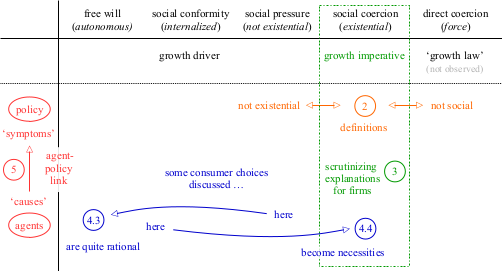
Published in: Structural Change and Economic Dynamics, 2019.
Authors/Autoren: Oliver Richters, Andreas Siemoneit.
Abstract
Economic growth remains a prominent political goal, despite its conflicts with ecological sustainability. Are growth policies only a question of political or individual will, or do ‘growth imperatives’ make them inescapable? We structure the debate along two dimensions: (a) degree of coerciveness between free will and coercion, and (b) agents affected. With carefully derived micro level definitions of ‘social coercion’ and ‘growth imperative’, we discuss several mechanisms suspected to make growth necessary for firms, households, and nation states. We identify technological innovations as a systematic necessity to net invest, trapping firms and households in a positive feedback loop to increase efficiency. Resource-intensive technology is economically attractive because of a subtle violation of the meritocratic principle of justice. The resulting dilemma between ‘technological unemployment’ and the social necessity of high employment explains why states ‘must’ foster economic growth. Politically, we suggest to institutionally limit resource consumption and redistribute economic rents.
